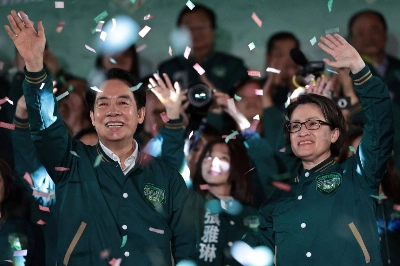Japan will find a like-minded ally in Taiwan President-elect Lai Ching-te, who hopes to build even stronger ties with Tokyo as both look warily at China’s designs on the self-ruled island.
Lai described his win in Saturday’s election as a “victory for the community of democracies,” and signaled that his administration would look to deepen cooperation with Japan by meeting with Tokyo’s de facto ambassador and a Japanese lawmaker just a day after the poll in Taipei.
Japan-Taiwan Exchange Association chief Mitsuo Ohashi held talks with Lai and his running mate, Hsiao Bi-khim, Taiwan's former top envoy to the United States, at the headquarters of Taiwan’s ruling Democratic Progressive Party, with the president-elect noting that the neighbors are both “concerned about regional peace and stability,” the DPP said.

















With your current subscription plan you can comment on stories. However, before writing your first comment, please create a display name in the Profile section of your subscriber account page.